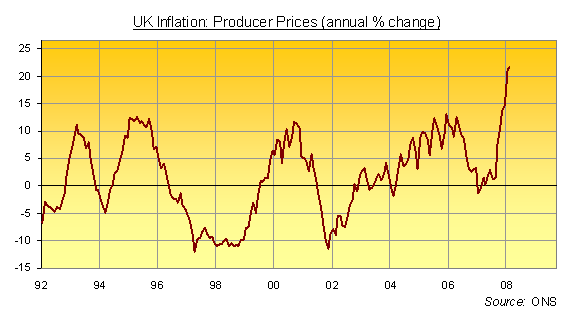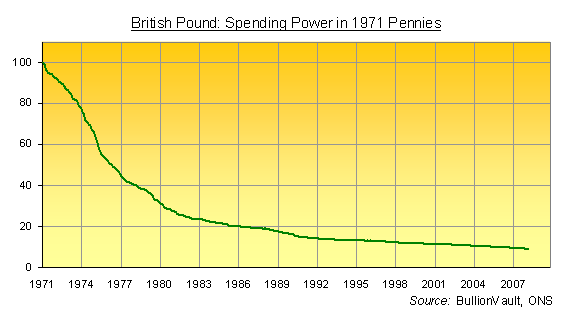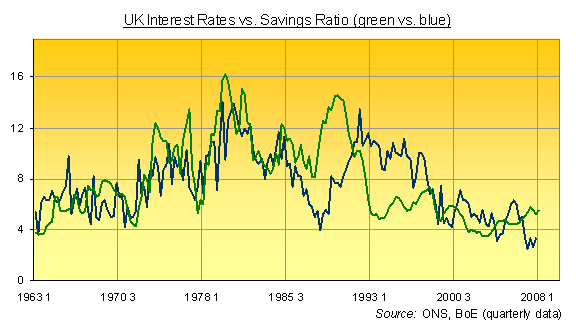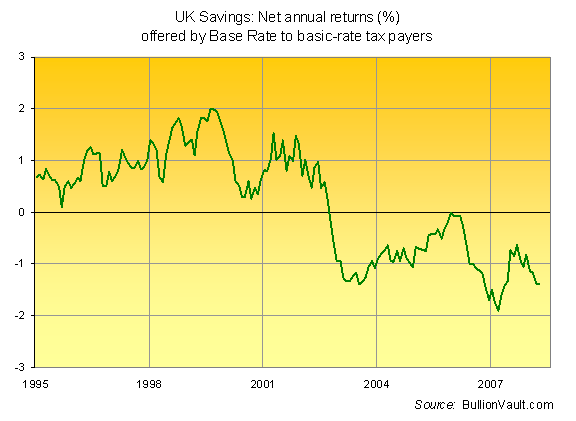UK Manipulated Inflation Statistics Erodes Value of Savings
Economics / UK Economy Apr 11, 2008 - 01:22 PM GMTBy: Adrian_Ash
 "...A short-back and sides for the value of Sterling – Trim, trim! Snip, snip...!"
"...A short-back and sides for the value of Sterling – Trim, trim! Snip, snip...!"
"ON THE DOWNSIDE," said the Bank of England when it trimmed UK interest rates by 0.25% on Thursday, "the disruption in financial markets could lead to a slowdown in the economy sufficiently sharp to pull inflation below target."
Note the Old Lady's choice words; the banking crisis "could lead" to lower inflation.
Note also her logic – that an economic slowdown can do her work for her. And she is 314 years old, after all, poor thing. Defending the value of Sterling for more than three centuries (the real meaning of her "inflation targeting" task) would wear out the toughest old boot!
But with the British Pound now worth less than half what it bought twenty years ago, the Bank will need all the help it can get in pulling inflation back below target.

Just like the United States , the UK is now suffering the worst inflation in industrial costs since the runaway inflation of the late 1970s.
Only this week, the UK 's official data agency pointed to 21% year-on-year price hikes on average. The Bureau for Labor Studies said US import costs rose 14.8% in March, up from 9.1% six months before.
Now you might counter that both countries – both dependent on imports for much of their industrial input, including crude oil – are also suffering on the currency markets. Both the Pound and the Dollar have been hammered vs. the Euro and Yen, not to mention the Chinese Yuan.
But that would only be to say just the same thing. The value of money is precisely the inverse of your rate of inflation. Currency traders only add to the pressure; they don't create it.
Back on Threadneedle Street meantime in the City of London , let's finally recall the Old Lady's decision this week: the Bank of England cut interest rates, albeit by a slim 0.25%, in the hope of forestalling the very same slowdown it hopes will ease the UK 's inflationary pressures.
Okay, so Mervyn King and his interest-rate trimmers are less melodramatic than Ben Bernanke's crowd in Washington . But can they really have it both ways? Just what do they want – a slowdown or not?
Snipping and trimming at the value of Sterling , we fear here at BullionVault , the UK will get a slowdown regardless, plus persistent inflation, taking us straight back to the stagflationary '70s.
Yet so far, at least, British savers and spenders still seem happy enough!
"We will have to lower our expectations of what property we can afford," grin a young couple splashed across the front page of Friday's Times . The credit crunch starting last summer has kept them and their baby locked out of the UK 's decade-long property boom. Merely tinkering with the cost of money looks unlikely to change that. Four major mortgage lenders actually raised their fixed-interest deals on the Old Lady's decision.
"It's not just the cost of hotels, it's the weak Pound," adds a young father, also snapped for The Times . Already planning his family's summer vacation in Europe , he's spotted the link between a currency's value and power. Yet he too smiles like inflation's not really a worry.
"My household bills are creeping up every day," agrees a young medical doctor with another soft smile, seemingly happy with the snail's pace of Sterling 's destruction. Perhaps the average GP's pay-rise of 58% since 2004 helps raise his spirits, up there at £113,164 per year ($221,800).
So it's left to two pensioners, Frank and Dorothy Beevers of Bexley, London, to bring true gloom to The Times ' doom-laden headline – "Consumer Crunch".
Trying to get by on the state pension – plus a private pension worth £4,000 per year ($7,850) – "it's not just the price of diesel that's going up," they mutter glumly. "It's more expensive for us to heat our home.
"Inflation is having a real effect," they add. And for them of course, aged over 65, it always has.

Back at the start of the 1970s – that most inflationary of decades – the United Kingdom got rid of its boring old Pound and its boring old pennies.
Out went the 240 pence of pre-decimalization. In came the new 100 pence of the decimal Pound. And funnily enough, the Pound has indeed been decimated since decimalization! It buys barely 9% of what the brave new Pound first bought back in 1971.
But the fastest destruction of Sterling 's spending power came in the nine years ending 1980, when the Pound lost three-quarters of its value at an average annual clip of 12% annually.
Now throw in that decade's disastrously high tax rates, and cash-in-the-bank just couldn't keep pace either, despite the record-high interest rates of the mid-to-late '70s.
In 1976 alone, even basic-rate taxpayers gave away one-sixth of their savings to tax and inflation if they dared save for the future by putting cash on deposit. Which incredibly is just what most people did...

The cost of borrowing soared as the cost of living shot higher.
Encouraged by these apparent great rates of return, British households piled their cash into savings accounts. As you can see, the ratio of savings to disposable income mapped the gross returns paid to cash pretty much tick-by-tick.
But what nobody told them – and what headline interest rates still keep hidden from view – was the true cost of saving £1 today to provide for the future.
One hundred New Pence tucked away in the bank during Jan. 1975 bought less than 63p worth of goods at '75 prices by the start of the '80s. That loss of more than one-third came despite interest rates averaging almost 11%.
Yes, things were very much worse three decades ago. But there's scant hope the Bank of England will avoid a repeat if it keeps snipping at base rates with its patented "baby step" cuts.

With the Old Lady now running interest-rate policy in line with both bond-market forecasts and the government's public instructions, the net loss to cash savers only seems set to grow worse.
"If you look at [the financial crisis] situation," said Gordon Brown, the prime minister, ahead of the BoE's vote, "because we've got low inflation we can cut interest rates."
If not quite a lie, it was a woefully misinformed claim. And either way, cash savers in Britain – as in the United States – might soon start to wonder:
Just what's the point of prudence?
By Adrian Ash
BullionVault.com
Gold price chart, no delay | Free Report: 5 Myths of the Gold Market
City correspondent for The Daily Reckoning in London and a regular contributor to MoneyWeek magazine, Adrian Ash is the editor of Gold News and head of research at www.BullionVault.com , giving you direct access to investment gold, vaulted in Zurich , on $3 spreads and 0.8% dealing fees.
(c) BullionVault 2008
Please Note: This article is to inform your thinking, not lead it. Only you can decide the best place for your money, and any decision you make will put your money at risk. Information or data included here may have already been overtaken by events – and must be verified elsewhere – should you choose to act on it.
Adrian Ash Archive |
© 2005-2022 http://www.MarketOracle.co.uk - The Market Oracle is a FREE Daily Financial Markets Analysis & Forecasting online publication.



